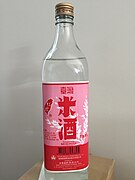food.wikisort.org - Beverage
Mijiu (Chinese: 米酒; pinyin: mǐjiǔ; Wade–Giles: mi-chiu; lit. 'rice wine') is a Chinese rice wine made from glutinous rice.[1] It is generally clear in appearance with balanced sweetness and acidity, similar to its Japanese counterpart sake and Korean counterpart cheongju. The alcohol content ranges between 15% and 20%. Rice wine was made around or before 1000 BC in ancient China, and then the practice spread to Japan and other East Asian countries. Since then, it has played an important role in Chinese life. In most Chinese supermarkets there are various kinds of rice wines. It is a traditional beverage to the Chinese and some of the families still follow the custom of making rice wine by themselves. The rice wine is made using glutinous rice, Chinese yeast and water. It is also served as an aperitif and is believed to be beneficial in improving metabolism and skin.
This article needs additional citations for verification. (January 2017) |
 Bottles of mijiu | |
| Type | Rice wine |
|---|---|
| Country of origin | China |
| Region of origin | East Asia |
| Alcohol by volume | 15%-20% |
| Proof (US) | 30-40 |
| Colour | Clear |
| Ingredients | Glutinous rice |
| Related products | Huangjiu, jiuniang, sake, cheongju |
Mijiu is usually drunk warm, like the Japanese sake and Korean cheongju, and is also used in cooking. The cooking mijiu available in Asian grocery stores are generally of a lower quality, and often contain added salt to avoid an alcohol tax. Mijiu is produced in mainland China and Taiwan.
A type of baijiu called rice baijiu (Chinese: 米白酒; pinyin: mǐ báijiǔ) is distilled from mijiu.
An unfiltered form of Chinese rice wine containing whole glutinous rice grains of extremely low alcoholic content and often consumed by children is called jiǔniàng (酒酿) or láozāo (醪糟).
In Taiwan, the Taiwan Tobacco and Liquor Corporation (Monopoly Bureau) is the main manufacturer, branded as Taiwan red label. The alcohol content is 19.5%.
Mijiu is commonly used in cooking dishes such as ginger duck, sesame oil chicken, and shochu chicken.[2]
Usage
The traditional way to use mijiu is to boil three bottles and evaporate the alcohol while cooking with the chicken. It is believed that by using this recipe one can help women's rehabilitation wound. Mijiu is also used in Jiuniang which is a dish that consists of the rice wine, rice particles, and sometimes glutinous rice balls. [3]
Dishes
Mijiu is used in Chinese desserts such as:
- Eggs spoiled in rice wine
- Sweet soup balls with rice wine
- Rice wine with brown sugar
Gallery
See also
- Huangjiu, another type of Chinese wine made from rice
- Rice baijiu, a distilled alcohol made from rice
- Jiuniang
- Sake, a Japanese equivalent
- Mirin
- Cheongju, a Korean equivalent
References
- Carlson, Gordon S. (1981). The Rice Journal. Volumes 84-87. p. 263.
- "紅標料理米酒". 台灣菸酒股份有限公司/Taiwan Tobacco & Liquor Corporation. 台灣菸酒股份有限公司/Taiwan Tobacco & Liquor Corporation. Retrieved 17 April 2016.
- 太元, 查. "台湾红标米酒与WTO那些事". No. dfdaily.com. 查太元. dfdaily.com. Retrieved 18 April 2016.[permanent dead link]
На других языках
- [en] Mijiu
[ru] Мицзю
Мицзю (китайский: 米酒, буквально «рисовое вино») — разновидность китайского ферментированного вина, сделанного из риса, которое производится в Китае и на Тайване. Как ферментированный напиток, считается разновидностью хуанцзю («жёлтого вина»). Обычно мицзю — прозрачный, сладковатый напиток, как и его японский эквивалент саке. Содержание алкоголя составляет от 12 до 20 %.Другой контент может иметь иную лицензию. Перед использованием материалов сайта WikiSort.org внимательно изучите правила лицензирования конкретных элементов наполнения сайта.
WikiSort.org - проект по пересортировке и дополнению контента Википедии

